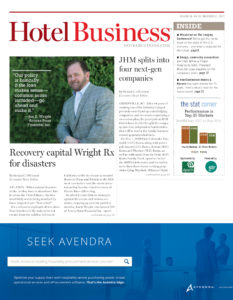HOUSTON—Navigating the aftermath of a weather event can be difficult in the best of circumstances. But the events of the 2017 Atlantic hurricane season—which saw major destruction from Hurricanes Harvey, Irma and Maria—make recovery even more complicated. Which is exactly why two law firms teamed up to help the hotel industry.
Texas-based Patel Gaines and Florida-based Farrell & Patel have partnered to ensure that hoteliers receive just and fair treatment of their property damage claims. “When Hurricane Harvey hit, we started getting some calls and emails from different hotel owners struggling with this issue,” explained Rahul Patel, managing partner of Patel Gaines. “Ricky [Patel, partner at Farrell & Patel] and I have always had a mutual respect for one another and we’ve both serviced the lodging industry. We both have duties and obligations to our business partners, but in reality, what happened to Houston and the coast was unprecedented. If we team up for this project, there’s much more that we could do together than we could ever do separately. For us, the ultimate objective was to help the lodging industry.”
According to Patel, there are several issues hoteliers face. “Number one, most folks were underinsured or uninsured. That’s the paramount issue for an event like this. The largest issue that faces everyone right now is the level of insurance they had or didn’t have,” he said. “Second, the issue has been the process. Many folks have insurance, and they have not been denied yet because the process is taking significantly longer than normal—because this was a huge storm, unlike one we’ve seen in the past.”
Hurricane Harvey made landfall in Texas, lashing the coast with 130-mph winds and dumping more than four ft. of rain on Houston and its surrounding areas, before retreating to the Gulf of Mexico and making a second landfall as a tropical storm near the Louisiana border. But, Patel said, a compounding issue is the hurricanes that followed, particularly Irma. According to estimates from Moody’s Analytics, the cost from both hurricanes could range from $150 billion to $200 billion.
“Those insurance companies that were already short on adjusters are now even more short on adjusters,” Patel said. “This is something relatively unprecedented—the scope, the severity, the length of time in which some of these issues happened. Many hoteliers haven’t gone through this, so it’s just a new event and they’re unsure. If you ask most folks what their insurance policies cover or exclude, you’ll be surprised to see how little people genuinely know about the insurance policies they have.”
Patel expanded on the types of questions that hoteliers are asking. “They’re a little scared as to the process. They don’t know who to trust and get involved with, or what to do, so many of them try to handle things on their own,” he said. “The types of questions coming to us are this: I’ve hired an adjuster—should I wait for that process to finish out before I hire an attorney? If I hire an adjuster and they’re telling me to use a certain attorney, do I have to use that attorney? If the adjuster tells me my claim is worth X or Y, do I have to take that number? Those are the most common questions. The fourth is this: I have this process, I haven’t heard anything—should I just sit around and wait for them to respond?”
Patel noted that, first and foremost, it’s important for hoteliers to engage with counsel. “Insurance companies are businesses—they operate for profit and they’re not there to stamp every claim,” he said, noting that between the damage done in Texas and Florida, insurance companies are facing huge payouts.
Hoteliers, he said, should have counsel “because when those denials come in, you have strict statutory timelines to take any kind of action.” Additionally, he said, “They don’t know to what extent the damage is unless they’ve got somebody truly watching over them. For those that haven’t chosen any type of representation, they’re going to be doing themselves a disservice in knowing whether they were actually appropriately represented, whether they have an actual claim or cause of action, and to what extent their recovery could have been.”
As far as the claims process, Patel expects this recovery process to be extraordinarily lengthy. “It was a bevy of one after another of hurricanes that hit. The process has been significantly slower simply because of the scope of what happened and the amount of time that it went; this wasn’t a one-day storm,” he said. “This continued to pound day after day. Ultimately, when it’s all said and done, the event to when resolutions are finally had will be longer.” HB

